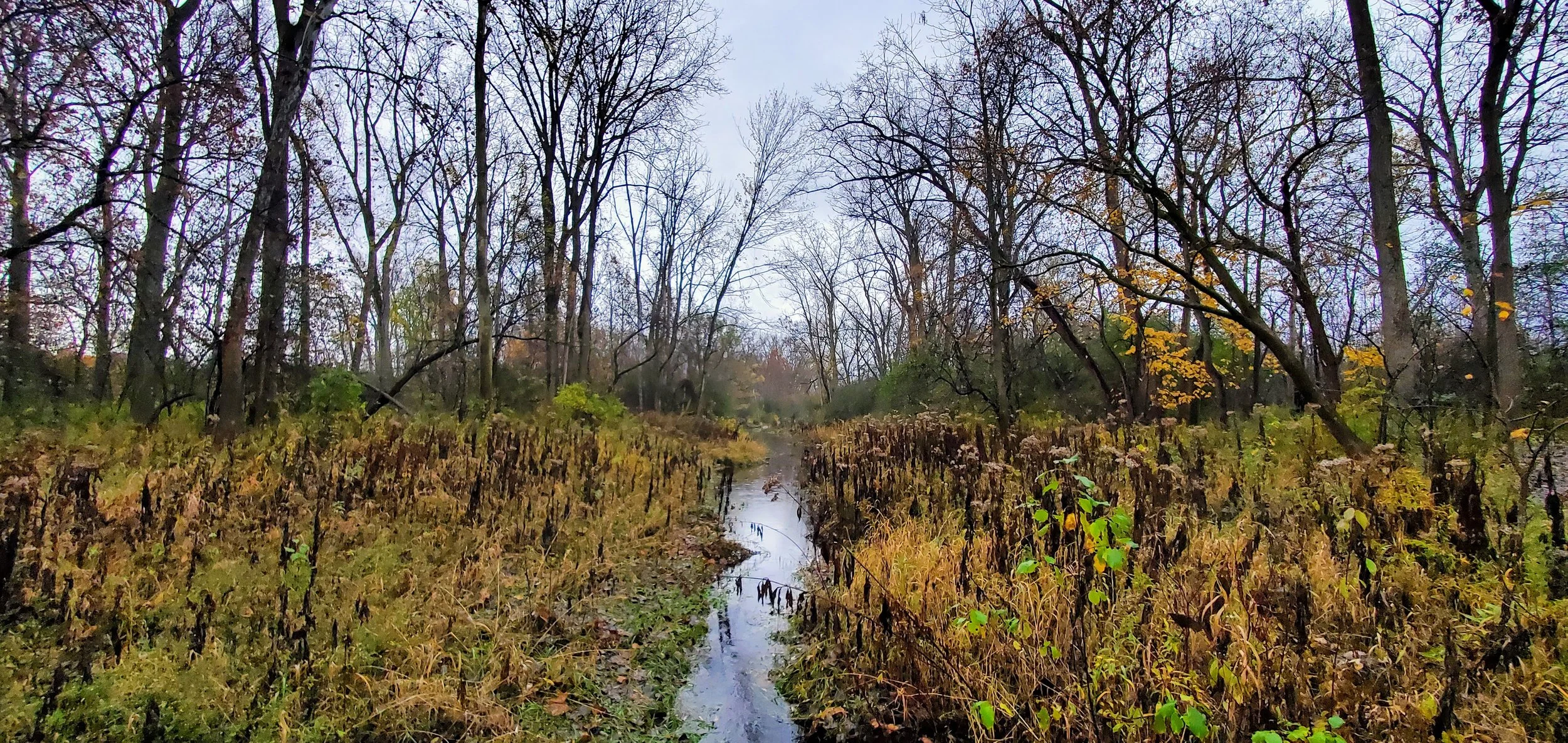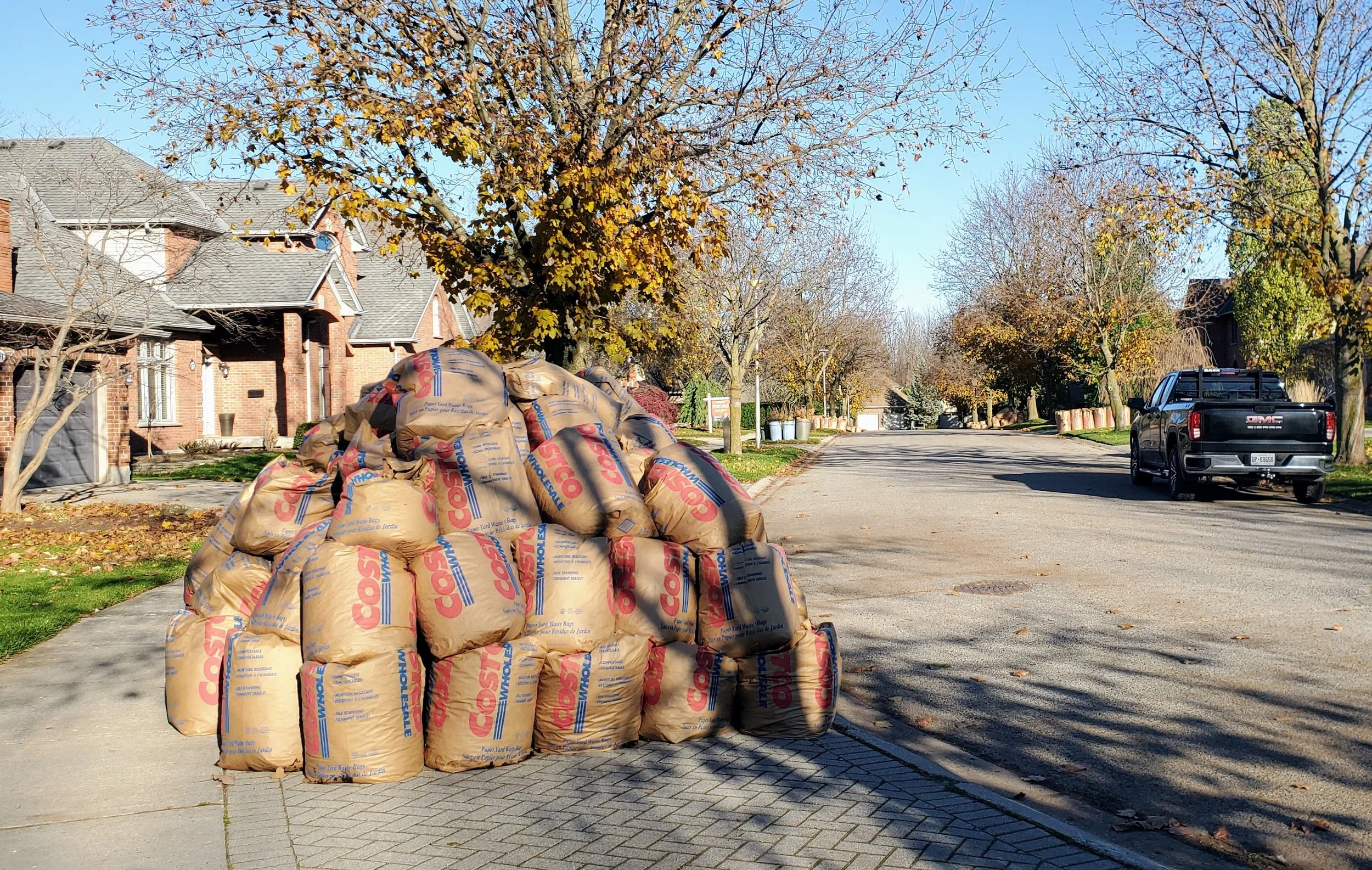As fall deepens, the changing trees stand testament to the season's beauty. These trees, different in species from those I'm familiar with, share a common characteristic – they are deciduous. The sight of their bare branches against the grey skies is a reminder that, as in life, change is constant. This leads us to a curious fall phenomenon – the shedding of leaves and what becomes of them.
This shedding of leaves, a spectacle of nature, brings us to a modern suburban ritual: the emergence of leaf blowers. As quickly as lawnmowers become silent, leaf blowers take the stage, marking a seamless yet significant change in our seasonal duties. What I have noticed between the leaf blowers and the lawn mowers, is that the lawn mowers collect their clippings or leave them strewn about the lawn, whereas the leaf blowers blow their leafy litter into the streets.
“Into the streets?! “ quipped The Youth.
“Yes, into the streets” said The Man
“But won’t the wind just blow it back aga….”
“Shhhh” The Man raised a finger to his lips “the cost of “perfection” is a constant struggle.”
I shouldn’t say all leaf blowers are culprits of this trend, there is the occasional leaf sucker collecting the leaves into a backpack-like container. Pretty neat. Leaf blowers working as a team, particularly for an organization like the University, blow all the leaves towards a truck where it is collected for removal. If you’re still reading this, leaf-blowing may strike a chord in your heart or you may be attempting to learn about the leaf-blowing business to save for your first car, either way, thank you. You may also be wondering, why is this guy going on about leaf blowers?
There is a core issue here, the leaf-blowing people who blow their leaves about willy-nilly into the streets. Firstly, and this is my observation, when blowing leaves off your property and into the street, they are bound to end up on someone else’s property and when hundreds of people practice this “removal” it really solves no issues for anyone. It is equivalent to collecting streamside trash, driving up river to dump it, and having to collect it again the following day. There is a proper disposal technique. The larger issue at hand is The Tragedy of the Commons.
One of the largest piles of personal leaf collection observed this fall
The tragedy of the commons is an ancient issue (which I learned researching for this post) and has struck civilizations back to ancient Greece. Aristotle is quoted saying “That which is common to the greatest number gets the least amount of care. Men pay most attention to what is their own: they care less for what is common”.
When I learned of the concept of the tragedy of the commons it was in reference to grazing in the American West, cattle were free to roam about and graze as they wished, until the day when those cattle had grazed all the grass from public land and the grazing collapsed. Ultimately, it was no rancher’s fault, but poor management. Today there are grazing fees and stocking rates (measured in animal units /acre or AMUs) to help manage the publicly held land. A more modern and relatable saying would be “not my property, not my problem” and when you take a minute to dissect this statement, the results are not great. For example purposes, we’ll apply it to leaf blowing here in London, Ontario.
Not my property, not my problem is inherently selfish and abandons the concept of neighborly love and community. All of those leaves that once littered the yard are now someone else’s problem (personally, I’d like to see the leaves naturally decompose, that’s for another day). They may blow into your neighbors’ yards, the schools, the streets, and even back into your own!
Before you get stirred up about these dastardly leaf-blowing low-life’s let’s take a step back and consider this on a societal level. Does society permit this behavior? Absolutely. Our society, I’ll speak of North America, encourages this behavior and permits it on a much larger scale than leaf-blowing. You may once again be thinking why is this guy going on about leaf blowing?
“It’s no longer about the payment, it’s about the principle” my roommate would say and it’s a good line when not used to intimidate folks. It’s not about leaf blowing it is about the principle of leaf blowing. This is a massively widespread issue and it is not about leaves. This issue extends to manufacturing, industry, agriculture, and even your local water treatment plant.
All of these sectors of our world are permitted to litter and, stay with me a second, this isn’t an eco-rant, they do it knowingly. There is a government-assigned threshold of water quality and the threshold is not zero. Therefore, as long as the water, or air, leaves the facility below the threshold, it is legal…but where does it go? Into OUR *gestures around* lakes, rivers, and air. Where it accumulates for generations to come (Refer to Let’s Go Swimming).
It’s not just the leaf-blowing neighbors who our crashing our collective party, it is everyone and everywhere. It is normal for everyone to exercise their, and participate in, the tragedy of the commons, whatever that “common” resource may be. It is completely normal, but that doesn’t make it okay.
Picking up your lawn leaves may be a pain, but it is your responsibility. Don’t place the burden on your neighbors and community. There are people to pay who will manage your waste for you, it is a booming business because everyone creates waste. Rather than follow the “not my property, not my problem” mantra, practice the “do your part” mantra, build your community, and create a culture where everyone can be responsible.



